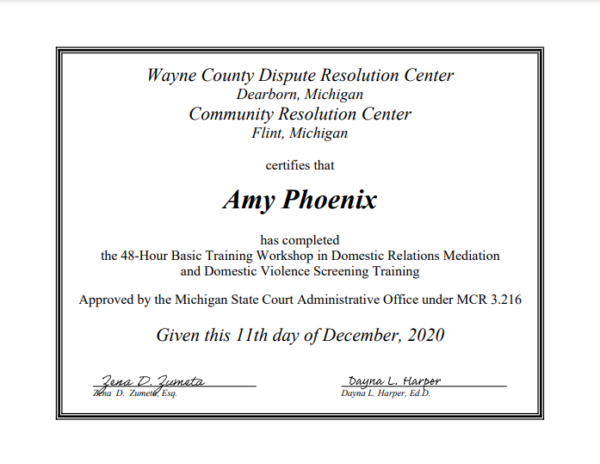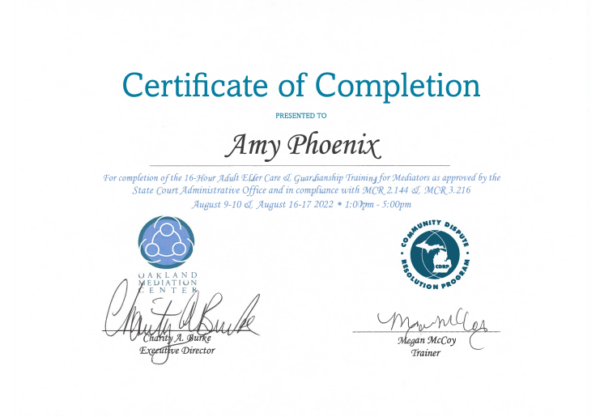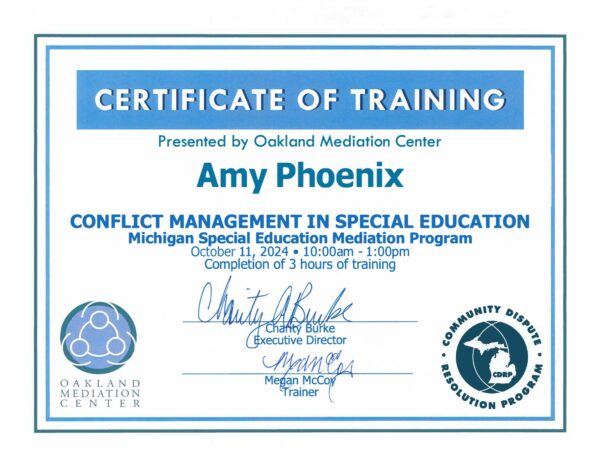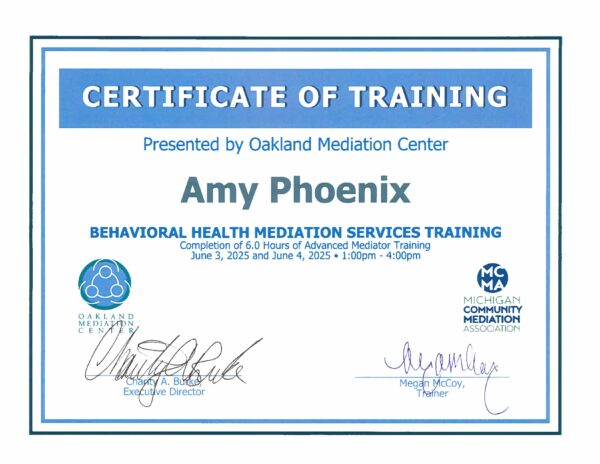Conflict can leave people feeling overwhelmed, stuck, or unsure how to move forward. Mediation offers a structured, supportive way to bridge differences and discover solutions that honor everyone involved.
Mediation is a voluntary process guided by a neutral, trained facilitator who helps create space for open communication, clarity, and collaborative problem solving. As parties identify shared interests and reach agreements, the mediator prepares a written document outlining those agreements. This document can be signed by all parties and, when needed, submitted to the court as a legally binding agreement. Ready to get started? Click here.
Background & Experience

As a mother of five and a long‑time advocate for peaceful conflict resolution, I bring both lived experience and formal training to my mediation practice. Parenting has offered countless opportunities to navigate communication challenges, support creative negotiation, and cultivate patience, clarity, and compassion — all qualities that directly inform the way I facilitate mediation.
My approach is grounded in the Michigan Mediator Standards of Conduct ensuring a respectful, ethical and thorough mediation experience. Alongside my mediation training, I draw from a broad background in community‑based problem solving, facilitation, and support work, which strengthens my ability to help people communicate clearly and work toward sustainable solutions.
Over the years, I’ve supported individuals and families through a wide range of transitions and challenges. My experience includes:
- Sharing communication skills with Our Community Listens
- Directing the Women’s Economic Empowerment Program for YWCA Great Lakes Bay Region
- Integrating mindfulness practices in schools and with at‑risk youth
- Supporting women in recovery through the Tri County Adjudication Program
- Facilitating social‑emotional skill building with The Rock Center for Youth Development
- Creating connected, empathetic community through The Visibility Project Podcast
- Volunteering as a Domestic Relations Mediator with the Community Resolution Center
Across all of these roles — whether in mediation or in other forms of collaborative problem solving — my focus remains the same: creating space where people feel heard, respected, and supported as they work toward meaningful resolution.
“If there is a conflict that cannot be solved by one’s own means,
Thomas Hubl
it is a responsibility, not a deficiency, to ask for support to create a movement.”
Areas of Mediation
All mediation services are trauma‑informed and designed to support collaborative problem solving with willing participants. If mediation is not suitable, referrals to alternative options may be explored.
Family Mediation – For family members navigating challenges related to health, education, elder care, or everyday conflict. Mediation helps reduce tension and supports sustainable, mutually agreeable solutions.
Divorce, Separation, Custody and Parenting Time Mediation – Ending a relationship or navigating co‑parenting can be deeply stressful. Mediation offers a respectful space to make decisions related to divorce, separation, custody, and parenting time while prioritizing the needs of everyone involved — especially children.
Guardianship & Elder Care Mediation – When loved ones need additional support, their preferences and needs are the priority. Mediation helps families understand what is most important to each person while centering the well‑being of the individual receiving care.
Special Education & Behavioral Health Mediation – Students and mental health service recipients deserve to have their needs clearly understood. Mediation supports communication between families, educators, and providers to ensure decisions reflect the interests of those receiving services.
Preparing for Mediation
Mediation sessions are typically scheduled for two hours and can take place online via Zoom or in person. Before scheduling, each participant completes a private safety screening to ensure mediation is appropriate and to identify any needed accommodations.
While it can be helpful to reflect on your interests beforehand, keeping an open mind allows space for new, collaborative solutions to emerge. Each participant will have the opportunity to share what matters most to them during the process.
Many people find it useful to set aside 15–30 minutes before mediation to prepare, and time afterward to decompress. Coming to the table during moments of tension takes courage, and acknowledging that effort is an important part of the process.
Frequently Asked Questions
Will mediation work for my situation? Mediation may or may not result in agreements. My commitment is to uphold the Michigan Mediator Standards of Conduct and support a good‑faith effort to explore what is possible. When all parties are willing to participate, mediation is often worth trying.
What are the risks of mediation? Sharing personal information can feel vulnerable. Not all participants arrive with the same level of respect or emotional readiness. Some people may leave without agreements and feel discouraged by the process. Mediation may not be suitable when someone cannot safely or effectively speak for themselves, when there is a history of violence that cannot be mitigated, or when other barriers prevent meaningful participation. Safety screenings help identify when mediation is not appropriate so alternative options can be explored.
How do you address risks during mediation? As a neutral facilitator, I work to mitigate risks by maintaining safety, clarity, and respect throughout the process. If challenges arise, they are addressed promptly so the focus can return to solution‑finding. Private caucus is always available for participants who need space to regroup or share information confidentially.
What are the benefits of mediation? Mediation offers the possibility of collaborative, sustainable solutions. Many people leave feeling relief, clarity, or closure — or at least a clearer path forward. Creativity, courage, curiosity, and connection often emerge when people choose to work together rather than avoid conflict or rely solely on the court system.
Request Mediation
Mediation sessions are scheduled in two‑hour blocks. If all parties feel the process is progressing well, a third hour may be added at the same hourly rate. Additional time can also be scheduled on another day if more space is needed to complete the conversation or finalize agreements. A sliding scale is available upon request to support accessibility while honoring the value of the work. Please click here to fill out a request for mediation to get started. I look forward to working with you!



